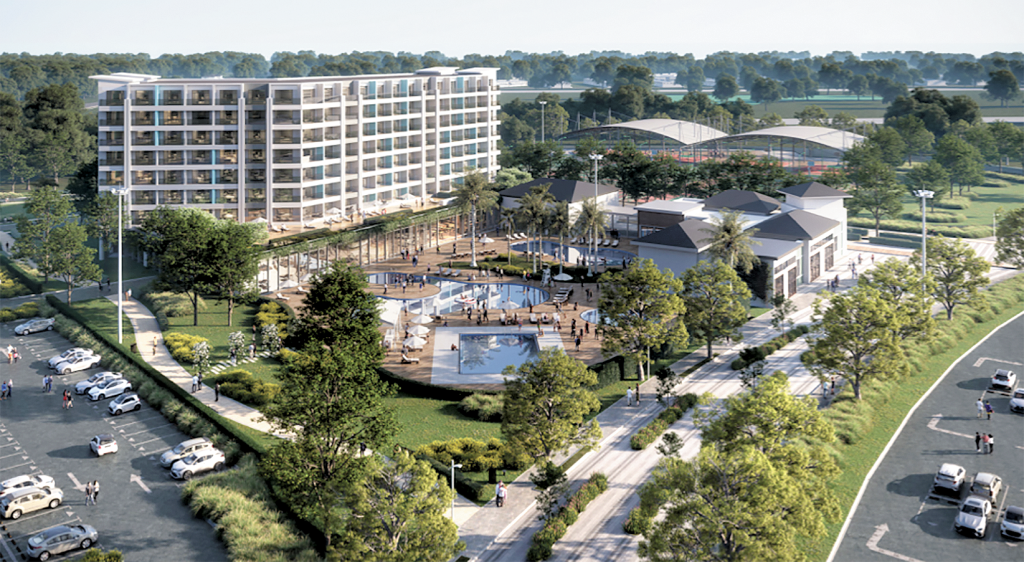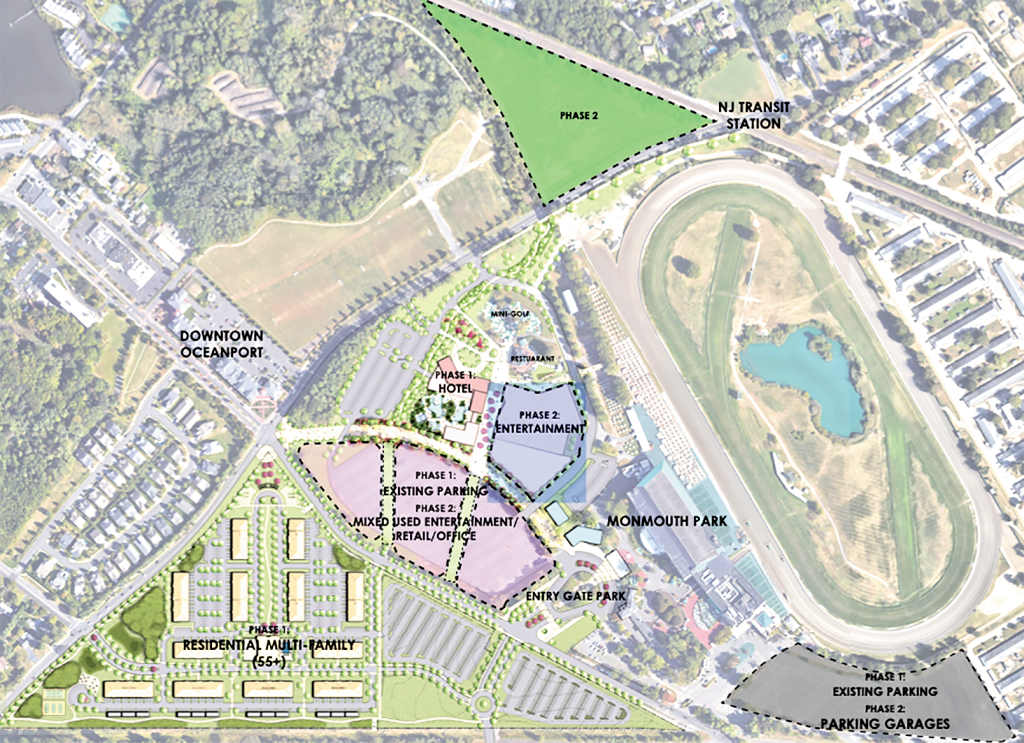
By Stephen Appezzato
OCEANPORT – Regardless of community concern, an eight-story hotel and 388- unit age-restricted development may eventually loom over Monmouth Park.
The project is the racetrack’s solution for securing a reliable, year-round cash flow. During a presentation to the borough July 20, Dennis Drazin, CEO of the park’s operating company Darby Development, explained the racetrack’s financial situation which led to the proposed development.
Under former Gov. Chris Christie, the state halted subsidies for horse racing tracks. When Gov. Phil Murphy took office, he reinstated temporary racing subsidies. Under the agreement, Monmouth Park received $10 million a year for five years. With 2023 being the final year of a guaranteed subsidy, park leadership recognized the need to generate a new form of income.
According to Drazin, the racetrack finally makes “a small profit” and is able to pay its bills and maintain competitive purses. This is largely due to the 2018 legalization of sports wagering in New Jersey.
If the racetrack loses the $10 million subsidy and doesn’t find another revenue source, Drazin said it would “probably mean we have to cut the days in half that we race.”
While hopeful, Drazin was unsure if state legislators would include the subsidy in next year’s state budget.

The proposed development, a 200-room hotel and 388-unit senior rental community consisting of 12 three-story apartment buildings, recreation facilities and a mixed-use area for retail, entertainment and offices, would be constructed in multiple phases. The lot located across from the park along Port Au Peck Avenue would house the 55-and-older development, while the hotel and mixed-use entertainment area would be built adjacent to the track.
The housing development would offer one-, two- and three-bedroom units. One-fifth of the units would be designated affordable housing.
The project is a joint effort between the New Jersey Sports and Exposition Authority (NJSEA), Darby Development and JEMB Realty, a real estate developer founded by entrepreneurs Morris Bailey and Joseph Jerome. JEMB is no stranger to the gaming industry, having been involved in the “turnaround of Atlantic City” and development of online sports betting, according to the company’s website. Drazin said Bailey has been a longtime supporter of Monmouth Park and thoroughbred racing, making him the perfect partner for the project.
“We’re before you tonight trying to do what we believe we should do as both good neighbors and what we feel is our obligation to you to come before you with the plan that we think is a good plan,” Drazin said, reinforcing that the park would like to maintain a positive relationship with its surrounding community.
Since the park grounds are under state ownership, development is not subject to Oceanport’s local zoning laws or council approval. Rather, the proposal was presented to the borough “for a courtesy review,” said Jennifer Phillips Smith, an attorney with Gibbons P.C. who represents the NJSEA. The state body has the authority to develop the land in ways “that are complementary to or in support of horse racing at Monmouth Park,” she said.
The borough council did not vehemently oppose the proposed development, however members and residents voiced concerns and questions about the project. Issues raised ranged from the traffic impact the development would have on local roads to the borough not having a fire truck that could even reach the upper stories of the proposed hotel in case of a fire.
Mayor Jay Coffey read a letter from borough planner Kendra Lelie which read, in part, that the “proposed development is not consistent with the overall borough character and specifically the surrounding neighborhood,” and recommended more detached single-family units instead of large apartment buildings.
Out of the proposed age-restricted rental community, 20% of the units would be designated affordable housing, although Lelie noted that only a fraction of the housing would count toward the borough’s required amount under state legislation. Affordable housing in the Two River area remains a complicated and unresolved matter, with many towns having difficulty locating space for new affordable developments.
Lelie also questioned the breakdown of the different units in the senior community. The development would be a mix of one-, two- and three-bedroom units, but, she noted, the proportions are odd. It is rare for senior communities to have so many three- and even two-bedroom units; most seniors live with their partner or alone, requiring only one bedroom.
Members of the public spoke about other concerns. “How is residential leasing complimentary to sports betting or horse racing?” asked resident Mike MacStudy. “Do we really think that we can support a 200-room hotel?” he said, referring to the borough’s reportedly maxed-out emergency services and roadway congestion around the park.
Gary LaBruno, another resident, mentioned the traffic impact the development could have. “While we can’t sit here today and say this project is going to make traffic worse, we can guarantee it is not going to make it better,” LaBruno said. The traffic around the intersection of Oceanport and Port Au Peck avenues is already a concern among residents.
“I feel the environmental impact of this proposed site plan is a little bit above and beyond what is reasonable,” said resident Christina Hewlitt. “I hope that you consider this very carefully and remember all things that are going to be impacted on those of us who live here,” she urged the council and developers.
Drazin and the presenters emphasized their willingness to hear the borough’s concerns on the project, pledging transparency and collaboration with the borough council and planning board. But, as uncertainty around the racetrack’s subsidy looms, Monmouth Park urgently looks to development as another source of revenue.
The article originally appeared in the July 27 – August 2, 2023 print edition of The Two River Times.














